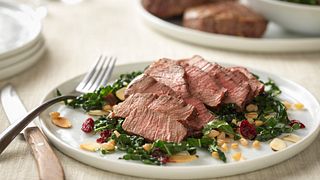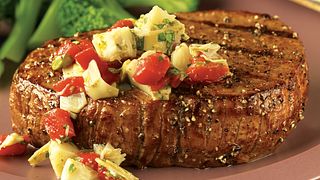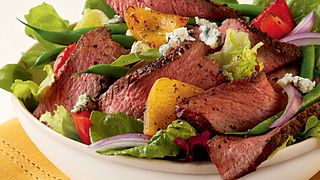New Study Finds Beef in a Mediterranean-Style Diet Supports Heart Health
june 13, 2018
Research released today by Purdue University found that following a Mediterranean-style eating pattern that includes lean red meats like lean beef is just as effective in supporting a healthy heart as a Mediterranean-style diet that limits red meats. This new research study adds to the growing body of scientific evidence demonstrating lean beef can be part of healthy eating patterns to support heart health and increase flexibility for healthy eating.
Specific findings from the new research, published in the American Journal of Clinical Nutrition, include:
- Following a Mediterranean-style eating pattern including 7 to 18 ounces of lean, fresh red meat per week was shown to improve cardiometabolic disease risk factor profiles. Fresh meats were defined in the study as requiring no further preservation or processing beyond refrigeration or freezing; they are not cured, salted or smoked or include chemical preservatives.
- Including 18 ounces of lean, fresh red meat per week as part of a Mediterranean-style dietary pattern was found to be more effective in lowering LDL cholesterol than a similar eating pattern that only included 7 ounces of lean, fresh red meat. The average American consumes 18 ounces of red meat per week.
- Study participants following a Mediterranean-style dietary pattern including up to 18 ounces of lean, fresh red meat per week saw reductions in total cholesterol, LDL-cholesterol, and blood pressure.
“The most important takeaway from this study is that Americans trying to eat healthier can enjoy lean beef as part of a Mediterranean-style eating pattern and improve cholesterol and blood pressure,” said Shalene McNeill, Ph.D., R.D., executive director of nutrition research for the National Cattlemen’s Beef Association, a contractor to the Beef Checkoff. “While this study focused on unprocessed lean red meat, research on processed meats in healthy diets is being planned because there are now many prepared meats, like lean deli roast beef, that are lower in fat and sodium.”
Taking place over a 16-week period, the study followed 41 overweight or obese adults who consumed differing amounts of lean red meat in Mediterranean-style diet interventions. The study was funded in part by the National Institute of Health’s Ingestive Behavior Research Center at Purdue University, the National Institute of Health’s Indiana Clinical and Translational Sciences Institute, the Beef Checkoff and the National Pork Board. These organizations had no role in in conducting the study, collection, analysis or interpretation of the data or writing of the manuscript.
Consuming a Mediterranean-style eating pattern is consistently associated with reduced risk of developing cardiovascular disease. It is often characterized by relatively high consumption of fruits, vegetables, whole-grains, nuts/seeds and olive oil.
The following Beef. It’s What’s For Dinner. recipes developed in the NCBA Culinary Center are tasty options for incorporating lean beef into Mediterranean-inspired meals.
About the Beef Checkoff
The Beef Checkoff Program was established as part of the 1985 Farm Bill. The checkoff assesses $1 per head on the sale of live domestic and imported cattle, in addition to a comparable assessment on imported beef and beef products. States may retain up to 50 cents on the dollar and forward the other 50 cents per head to the Cattlemen's Beef Promotion and Research Board, which administers the national checkoff program, subject to USDA approval.
About NCBA, a Contractor to the Beef Checkoff
The National Cattlemen’s Beef Association (NCBA) is a contractor to the Beef Checkoff Program. The Beef Checkoff Program is administered by the Cattlemen’s Beef Board, with oversight provided by the U.S. Department of Agriculture.






